Lili Su
Personalized Federated Learning via Feature Distribution Adaptation
Nov 01, 2024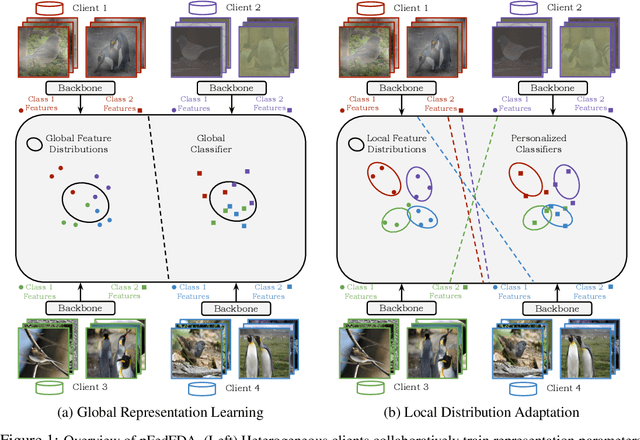
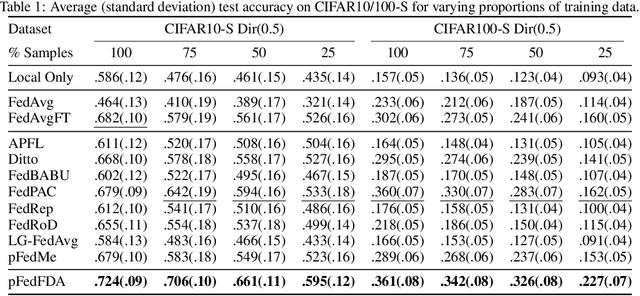
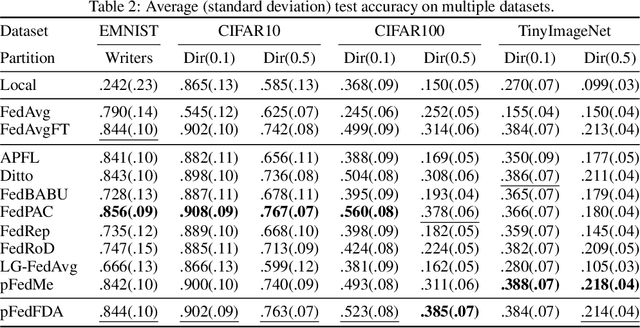
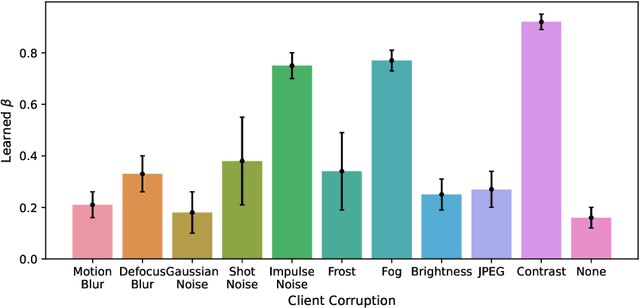
Abstract:Federated learning (FL) is a distributed learning framework that leverages commonalities between distributed client datasets to train a global model. Under heterogeneous clients, however, FL can fail to produce stable training results. Personalized federated learning (PFL) seeks to address this by learning individual models tailored to each client. One approach is to decompose model training into shared representation learning and personalized classifier training. Nonetheless, previous works struggle to navigate the bias-variance trade-off in classifier learning, relying solely on limited local datasets or introducing costly techniques to improve generalization. In this work, we frame representation learning as a generative modeling task, where representations are trained with a classifier based on the global feature distribution. We then propose an algorithm, pFedFDA, that efficiently generates personalized models by adapting global generative classifiers to their local feature distributions. Through extensive computer vision benchmarks, we demonstrate that our method can adjust to complex distribution shifts with significant improvements over current state-of-the-art in data-scarce settings.
Non-transferable Pruning
Oct 10, 2024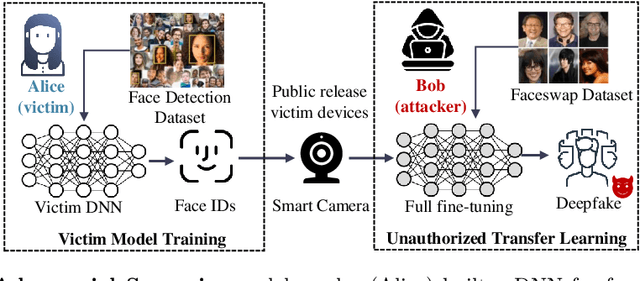
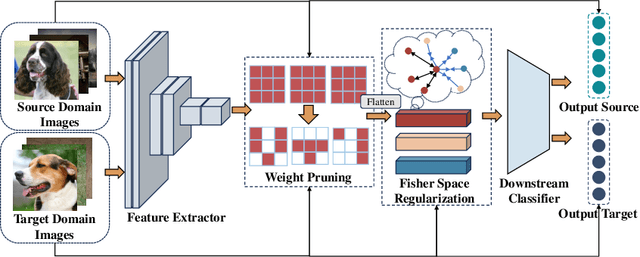

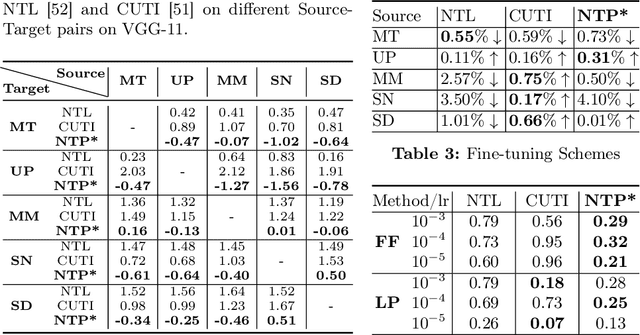
Abstract:Pretrained Deep Neural Networks (DNNs), developed from extensive datasets to integrate multifaceted knowledge, are increasingly recognized as valuable intellectual property (IP). To safeguard these models against IP infringement, strategies for ownership verification and usage authorization have emerged. Unlike most existing IP protection strategies that concentrate on restricting direct access to the model, our study addresses an extended DNN IP issue: applicability authorization, aiming to prevent the misuse of learned knowledge, particularly in unauthorized transfer learning scenarios. We propose Non-Transferable Pruning (NTP), a novel IP protection method that leverages model pruning to control a pretrained DNN's transferability to unauthorized data domains. Selective pruning can deliberately diminish a model's suitability on unauthorized domains, even with full fine-tuning. Specifically, our framework employs the alternating direction method of multipliers (ADMM) for optimizing both the model sparsity and an innovative non-transferable learning loss, augmented with Fisher space discriminative regularization, to constrain the model's generalizability to the target dataset. We also propose a novel effective metric to measure the model non-transferability: Area Under the Sample-wise Learning Curve (SLC-AUC). This metric facilitates consideration of full fine-tuning across various sample sizes. Experimental results demonstrate that NTP significantly surpasses the state-of-the-art non-transferable learning methods, with an average SLC-AUC at $-0.54$ across diverse pairs of source and target domains, indicating that models trained with NTP do not suit for transfer learning to unauthorized target domains. The efficacy of NTP is validated in both supervised and self-supervised learning contexts, confirming its applicability in real-world scenarios.
Efficient Federated Learning against Heterogeneous and Non-stationary Client Unavailability
Sep 26, 2024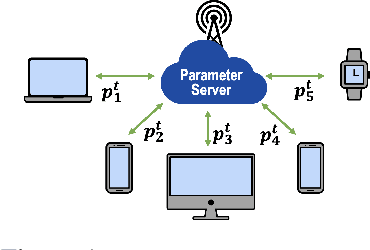
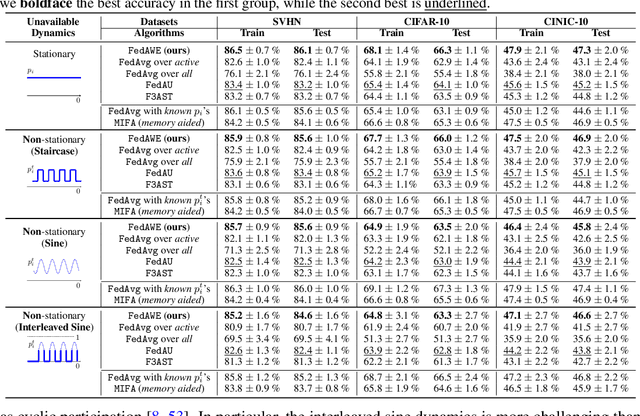
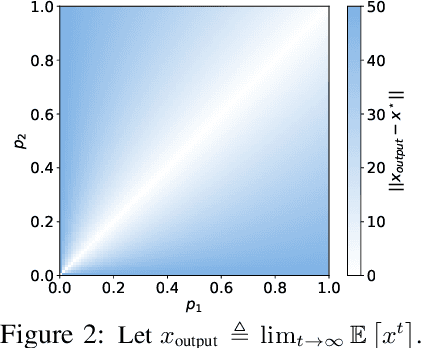

Abstract:Addressing intermittent client availability is critical for the real-world deployment of federated learning algorithms. Most prior work either overlooks the potential non-stationarity in the dynamics of client unavailability or requires substantial memory/computation overhead. We study federated learning in the presence of heterogeneous and non-stationary client availability, which may occur when the deployment environments are uncertain or the clients are mobile. The impacts of the heterogeneity and non-stationarity in client unavailability can be significant, as we illustrate using FedAvg, the most widely adopted federated learning algorithm. We propose FedAPM, which includes novel algorithmic structures that (i) compensate for missed computations due to unavailability with only $O(1)$ additional memory and computation with respect to standard FedAvg, and (ii) evenly diffuse local updates within the federated learning system through implicit gossiping, despite being agnostic to non-stationary dynamics. We show that FedAPM converges to a stationary point of even non-convex objectives while achieving the desired linear speedup property. We corroborate our analysis with numerical experiments over diversified client unavailability dynamics on real-world data sets.
Reactive Multi-Robot Navigation in Outdoor Environments Through Uncertainty-Aware Active Learning of Human Preference Landscape
Sep 25, 2024
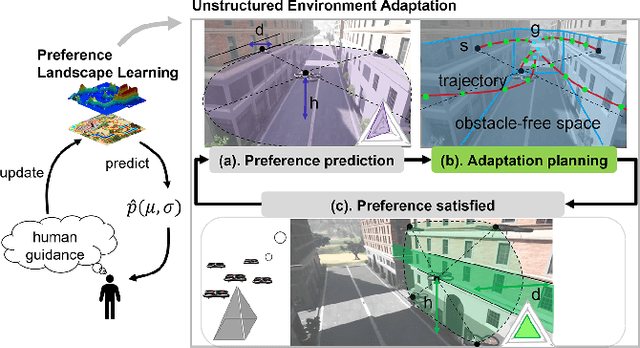
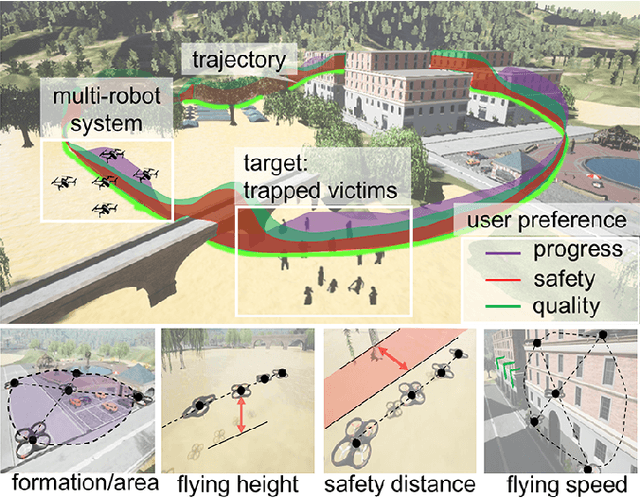
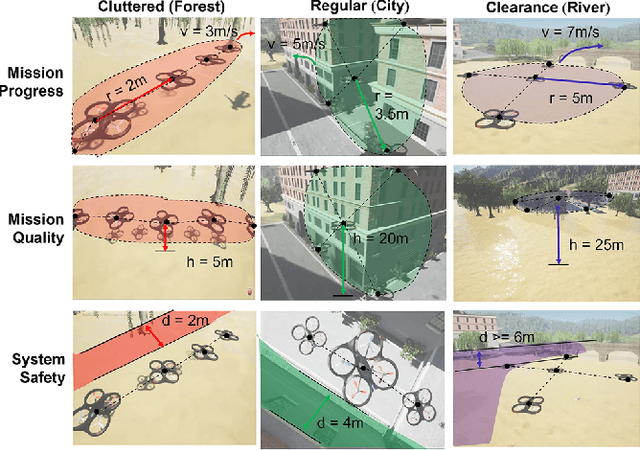
Abstract:Compared with single robots, Multi-Robot Systems (MRS) can perform missions more efficiently due to the presence of multiple members with diverse capabilities. However, deploying an MRS in wide real-world environments is still challenging due to uncertain and various obstacles (e.g., building clusters and trees). With a limited understanding of environmental uncertainty on performance, an MRS cannot flexibly adjust its behaviors (e.g., teaming, load sharing, trajectory planning) to ensure both environment adaptation and task accomplishments. In this work, a novel joint preference landscape learning and behavior adjusting framework (PLBA) is designed. PLBA efficiently integrates real-time human guidance to MRS coordination and utilizes Sparse Variational Gaussian Processes with Varying Output Noise to quickly assess human preferences by leveraging spatial correlations between environment characteristics. An optimization-based behavior-adjusting method then safely adapts MRS behaviors to environments. To validate PLBA's effectiveness in MRS behavior adaption, a flood disaster search and rescue task was designed. 20 human users provided 1764 feedback based on human preferences obtained from MRS behaviors related to "task quality", "task progress", "robot safety". The prediction accuracy and adaptation speed results show the effectiveness of PLBA in preference learning and MRS behavior adaption.
Building Real-time Awareness of Out-of-distribution in Trajectory Prediction for Autonomous Vehicles
Sep 25, 2024



Abstract:Trajectory prediction describes the motions of surrounding moving obstacles for an autonomous vehicle; it plays a crucial role in enabling timely decision-making, such as collision avoidance and trajectory replanning. Accurate trajectory planning is the key to reliable vehicle deployments in open-world environment, where unstructured obstacles bring in uncertainties that are impossible to fully capture by training data. For traditional machine learning tasks, such uncertainties are often addressed reasonably well via methods such as continual learning. On the one hand, naively applying those methods to trajectory prediction can result in continuous data collection and frequent model updates, which can be resource-intensive. On the other hand, the predicted trajectories can be far away from the true trajectories, leading to unsafe decision-making. In this paper, we aim to establish real-time awareness of out-of-distribution in trajectory prediction for autonomous vehicles. We focus on the challenging and practically relevant setting where the out-of-distribution is deceptive, that is, the one not easily detectable by human intuition. Drawing on the well-established techniques of sequential analysis, we build real-time awareness of out-of-distribution by monitoring prediction errors using the quickest change point detection (QCD). Our solutions are lightweight and can handle the occurrence of out-of-distribution at any time during trajectory prediction inference. Experimental results on multiple real-world datasets using a benchmark trajectory prediction model demonstrate the effectiveness of our methods.
Data-efficient Trajectory Prediction via Coreset Selection
Sep 25, 2024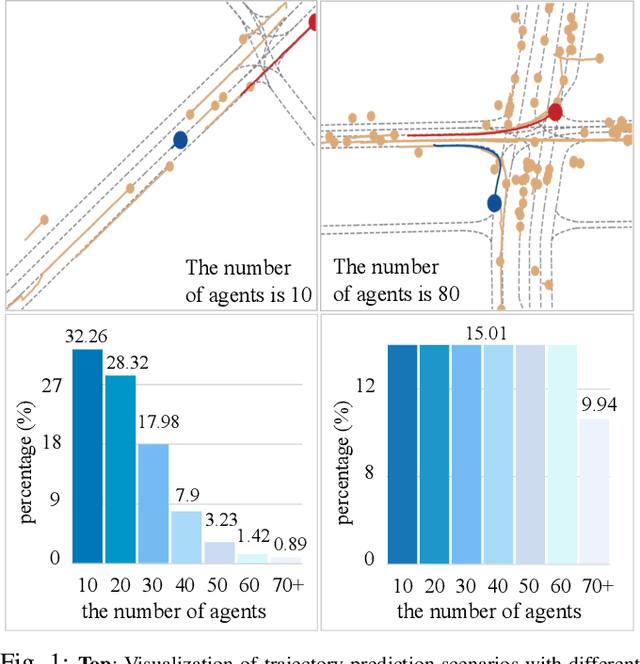
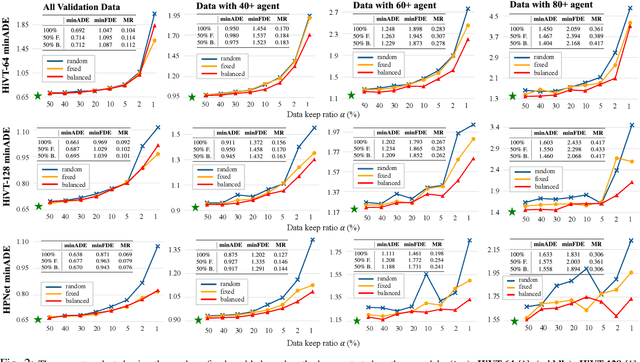
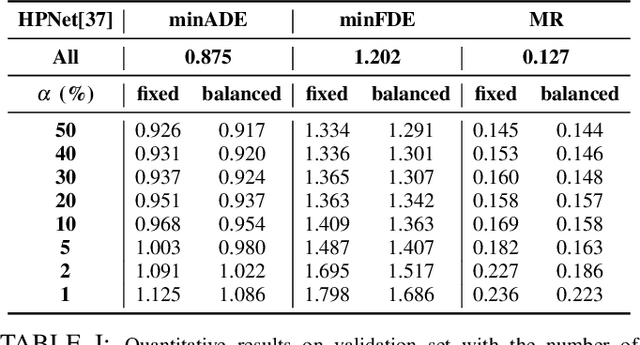
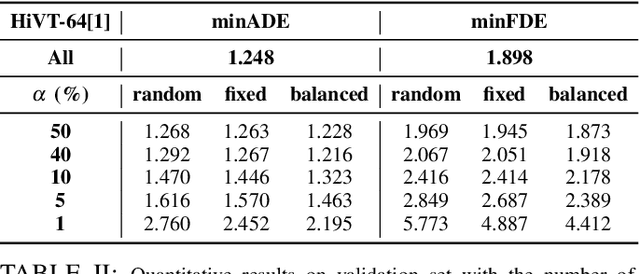
Abstract:Modern vehicles are equipped with multiple information-collection devices such as sensors and cameras, continuously generating a large volume of raw data. Accurately predicting the trajectories of neighboring vehicles is a vital component in understanding the complex driving environment. Yet, training trajectory prediction models is challenging in two ways. Processing the large-scale data is computation-intensive. Moreover, easy-medium driving scenarios often overwhelmingly dominate the dataset, leaving challenging driving scenarios such as dense traffic under-represented. For example, in the Argoverse motion prediction dataset, there are very few instances with $\ge 50$ agents, while scenarios with $10 \thicksim 20$ agents are far more common. In this paper, to mitigate data redundancy in the over-represented driving scenarios and to reduce the bias rooted in the data scarcity of complex ones, we propose a novel data-efficient training method based on coreset selection. This method strategically selects a small but representative subset of data while balancing the proportions of different scenario difficulties. To the best of our knowledge, we are the first to introduce a method capable of effectively condensing large-scale trajectory dataset, while achieving a state-of-the-art compression ratio. Notably, even when using only 50% of the Argoverse dataset, the model can be trained with little to no decline in performance. Moreover, the selected coreset maintains excellent generalization ability.
Collaborative Learning with Shared Linear Representations: Statistical Rates and Optimal Algorithms
Sep 07, 2024Abstract:Collaborative learning enables multiple clients to learn shared feature representations across local data distributions, with the goal of improving model performance and reducing overall sample complexity. While empirical evidence shows the success of collaborative learning, a theoretical understanding of the optimal statistical rate remains lacking, even in linear settings. In this paper, we identify the optimal statistical rate when clients share a common low-dimensional linear representation. Specifically, we design a spectral estimator with local averaging that approximates the optimal solution to the least squares problem. We establish a minimax lower bound to demonstrate that our estimator achieves the optimal error rate. Notably, the optimal rate reveals two distinct phases. In typical cases, our rate matches the standard rate based on the parameter counting of the linear representation. However, a statistical penalty arises in collaborative learning when there are too many clients or when local datasets are relatively small. Furthermore, our results, unlike existing ones, show that, at a system level, collaboration always reduces overall sample complexity compared to independent client learning. In addition, at an individual level, we provide a more precise characterization of when collaboration benefits a client in transfer learning and private fine-tuning.
On the Convergence Rates of Federated Q-Learning across Heterogeneous Environments
Sep 05, 2024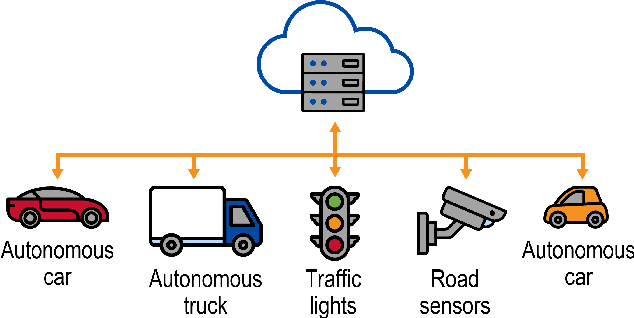
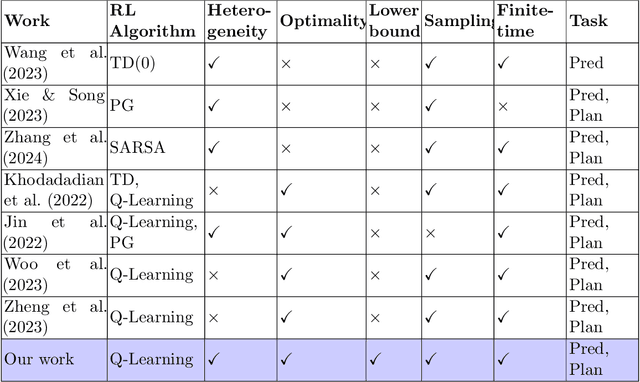
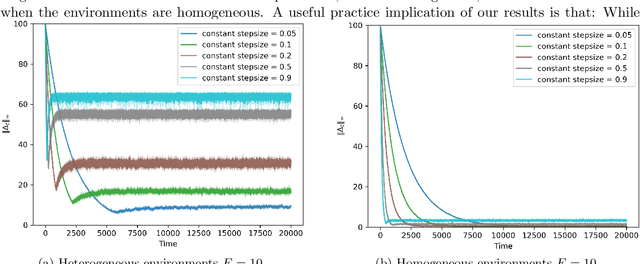

Abstract:Large-scale multi-agent systems are often deployed across wide geographic areas, where agents interact with heterogeneous environments. There is an emerging interest in understanding the role of heterogeneity in the performance of the federated versions of classic reinforcement learning algorithms. In this paper, we study synchronous federated Q-learning, which aims to learn an optimal Q-function by having $K$ agents average their local Q-estimates per $E$ iterations. We observe an interesting phenomenon on the convergence speeds in terms of $K$ and $E$. Similar to the homogeneous environment settings, there is a linear speed-up concerning $K$ in reducing the errors that arise from sampling randomness. Yet, in sharp contrast to the homogeneous settings, $E>1$ leads to significant performance degradation. Specifically, we provide a fine-grained characterization of the error evolution in the presence of environmental heterogeneity, which decay to zero as the number of iterations $T$ increases. The slow convergence of having $E>1$ turns out to be fundamental rather than an artifact of our analysis. We prove that, for a wide range of stepsizes, the $\ell_{\infty}$ norm of the error cannot decay faster than $\Theta (E/T)$. In addition, our experiments demonstrate that the convergence exhibits an interesting two-phase phenomenon. For any given stepsize, there is a sharp phase-transition of the convergence: the error decays rapidly in the beginning yet later bounces up and stabilizes. Provided that the phase-transition time can be estimated, choosing different stepsizes for the two phases leads to faster overall convergence.
Fair Concurrent Training of Multiple Models in Federated Learning
Apr 22, 2024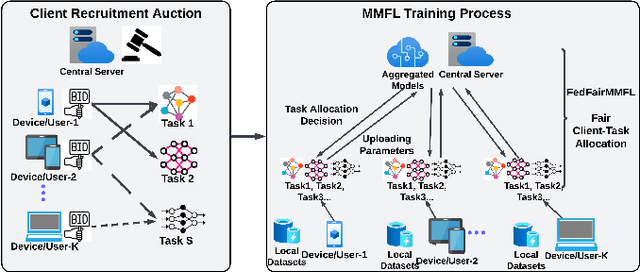
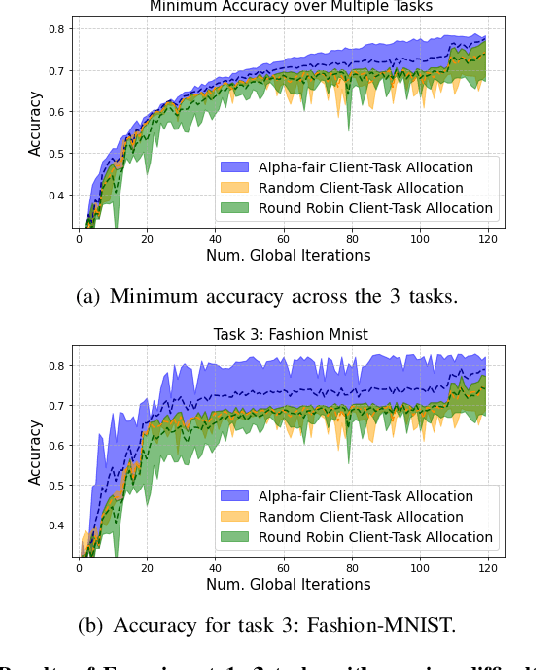
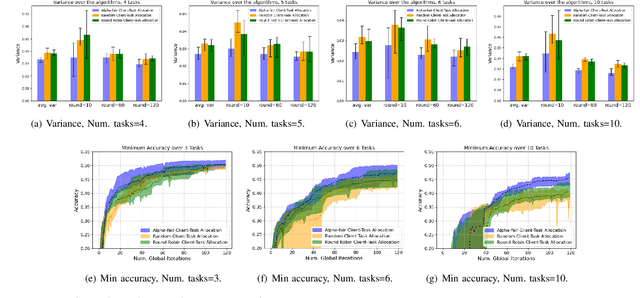

Abstract:Federated learning (FL) enables collaborative learning across multiple clients. In most FL work, all clients train a single learning task. However, the recent proliferation of FL applications may increasingly require multiple FL tasks to be trained simultaneously, sharing clients' computing and communication resources, which we call Multiple-Model Federated Learning (MMFL). Current MMFL algorithms use naive average-based client-task allocation schemes that can lead to unfair performance when FL tasks have heterogeneous difficulty levels, e.g., tasks with larger models may need more rounds and data to train. Just as naively allocating resources to generic computing jobs with heterogeneous resource needs can lead to unfair outcomes, naive allocation of clients to FL tasks can lead to unfairness, with some tasks having excessively long training times, or lower converged accuracies. Furthermore, in the FL setting, since clients are typically not paid for their training effort, we face a further challenge that some clients may not even be willing to train some tasks, e.g., due to high computational costs, which may exacerbate unfairness in training outcomes across tasks. We address both challenges by firstly designing FedFairMMFL, a difficulty-aware algorithm that dynamically allocates clients to tasks in each training round. We provide guarantees on airness and FedFairMMFL's convergence rate. We then propose a novel auction design that incentivizes clients to train multiple tasks, so as to fairly distribute clients' training efforts across the tasks. We show how our fairness-based learning and incentive mechanisms impact training convergence and finally evaluate our algorithm with multiple sets of learning tasks on real world datasets.
Empowering Federated Learning with Implicit Gossiping: Mitigating Connection Unreliability Amidst Unknown and Arbitrary Dynamics
Apr 15, 2024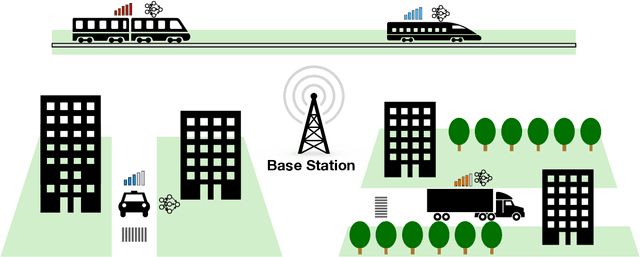
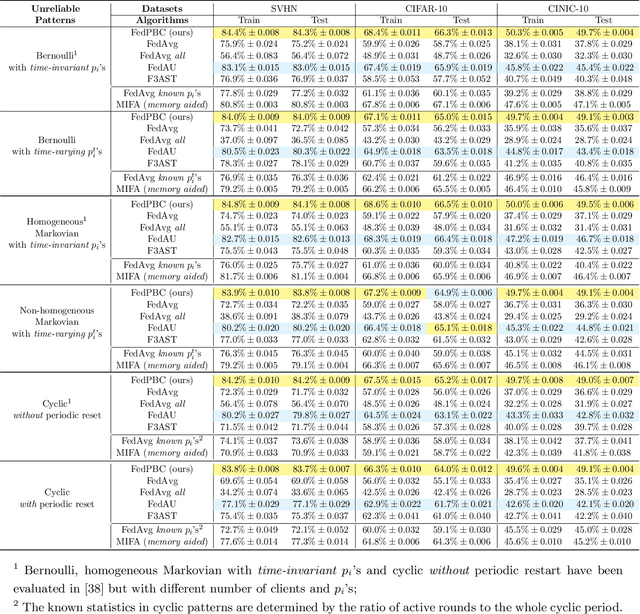
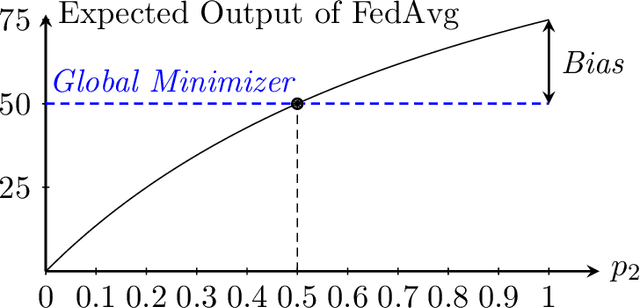
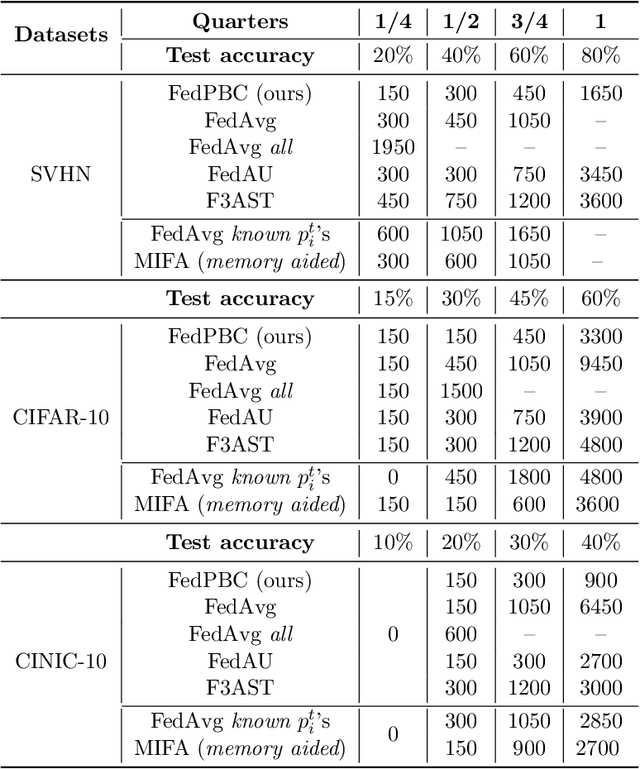
Abstract:Federated learning is a popular distributed learning approach for training a machine learning model without disclosing raw data. It consists of a parameter server and a possibly large collection of clients (e.g., in cross-device federated learning) that may operate in congested and changing environments. In this paper, we study federated learning in the presence of stochastic and dynamic communication failures wherein the uplink between the parameter server and client $i$ is on with unknown probability $p_i^t$ in round $t$. Furthermore, we allow the dynamics of $p_i^t$ to be arbitrary. We first demonstrate that when the $p_i^t$'s vary across clients, the most widely adopted federated learning algorithm, Federated Average (FedAvg), experiences significant bias. To address this observation, we propose Federated Postponed Broadcast (FedPBC), a simple variant of FedAvg. FedPBC differs from FedAvg in that the parameter server postpones broadcasting the global model till the end of each round. Despite uplink failures, we show that FedPBC converges to a stationary point of the original non-convex objective. On the technical front, postponing the global model broadcasts enables implicit gossiping among the clients with active links in round $t$. Despite the time-varying nature of $p_i^t$, we can bound the perturbation of the global model dynamics using techniques to control gossip-type information mixing errors. Extensive experiments have been conducted on real-world datasets over diversified unreliable uplink patterns to corroborate our analysis.
 Add to Chrome
Add to Chrome Add to Firefox
Add to Firefox Add to Edge
Add to Edge